I thought video referees would be a good idea... I couldn't have been more wrong
The Confederations Cup has showed why football is not ready for such interference during the game

“Minimum interference, maximum benefit” was what the Video Assistant Referee (VAR) was meant to bring to football.
Those were the words used by David Elleray, technical director of the International Football Association Board (IFAB), in a presentation he gave to journalists at Wembley Stadium in March. He was speaking optimistically about how VAR would improve the game and how, if it worked well, it could even be used at the 2018 World Cup.
There was plenty of optimism in the room about the plans, including from this reporter. Technology has done wonders for cricket and rugby union. Just look at Sonny Bill Williams’ red card in Wellington on Saturday morning, for thumping his shoulder into Anthony Watson’s face, the severity of which was easily missed in real time.
And yet just over 24 hours later in St Petersburg, football’s VAR system completely failed to punish an assault almost as bad. Early in the second half of the Confederations Cup final, Gonzalo Jara swung an elbow into Timo Werner’s face. The referee Milorad Mazic consulted the VAR and after a four-minute delay he still got the decision wrong.
It was just the latest example of a VAR system that is clearly not doing what it was built for. If this is a trial there is no way it can pass. The story of VAR at the Confederations Cup was one of long waits, mistaken identity, confusion and errors. Players and fans were too often in the dark about what was happening. This was the opposite of what IFAB had promised us. This was maximum interference, minimum benefit. And of course Fifa president Gianni Infantino said that it had been a “great success”.
Maybe we should have all listened to Paul Ince. He was roundly criticised on Twitter when he said on television in March that football is “all about right and wrong decisions”, and that spending too much time trying to get decisions right was not why people love the game.
And yet Ince hit on something very important in those comments. First, that football’s fast fluency is why it is the most popular sport in the world. As soon as there are five-minute stoppages for decisions, something gets lost. David Elleray did say that IFAB “do not want to destroy the essential flow and emotions of football” and yet there is no getting past the fact that VAR risks doing exactly that.

Even more important is the fact that many football decisions, unlike, in almost all instances, cricket decisions, are subjective. Red cards for serious foul play rely on an interpretation of “excessive force or brutality” which is the most contested concept in the game. It is simply a different category from measuring whether a ball has pitched outside leg, or whether a batsman has made it back into his or her ground. Think about how many red card decisions are argued about by television pundits with the benefit of hundreds of slow-motion replays. If the answers are not clear to them then nor will they become clear to one VAR, watching in a booth, with the clock ticking.
So if there is no way of getting clear answers, ending controversy or resolving debate, then why tear up the whole flow of football to try to get there? Of course the easily measurable questions are best answered by technology, and that is why the ‘goal decision system’ has been such an uncontroversial success in the Premier League. Extending that to other measurable questions is right.
But IFAB wanted VAR to end “headline mistakes and scandals”. All they have done is make more ‘headline mistakes’ than they started with, more controversy and fewer answers.
Referees are as flawed as any of us, even if they are sat in a booth with a slow-motion replay to pore over. Subjectivity, like emotion and bias, is part of the fabric of the game. Sometimes football is best left room to breathe.
Join our commenting forum
Join thought-provoking conversations, follow other Independent readers and see their replies
Comments
Bookmark popover
Removed from bookmarks